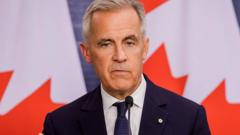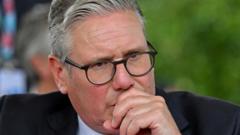Could Weah and Drogba Transform FIFA's Fight Against Racism?

Published: 2025-09-05 17:08:06 | Category: sport
The newly formed FIFA panel, featuring football legends like George Weah and Didier Drogba, aims to combat racism in football by advising on anti-racism strategies and participating in educational programmes. This initiative, announced at FIFA's annual congress in May 2024, seeks to create lasting change in the sport.
Last updated: 01 November 2023 (BST)
Key Takeaways
- The FIFA panel includes 16 ex-players from 14 countries.
- George Weah serves as the panel's honorary captain.
- The initiative aims to promote anti-racism strategies in football.
- FIFA President Gianni Infantino emphasised the need for action against racism.
- Panel members will participate in educational programmes and reforms.
Background of the Initiative
The fight against racism in football has gained significant attention in recent years. Incidents of racial abuse have been reported regularly, highlighting the need for decisive action. FIFA, the sport's global governing body, recognised this pressing issue and announced the formation of a players' voice panel during its annual congress in Thailand in May 2024.
This panel, consisting of 16 former players from various countries, is tasked with advising FIFA on anti-racism strategies. The creation of this group reflects a broader commitment to fostering inclusivity and equality within the sport, addressing not just overt racism but also the subtler forms of discrimination that persist in football culture.
Who is on the Panel?
The panel features a diverse range of ex-players, both men and women, representing a variety of countries and backgrounds. Here’s a closer look at the members:
- George Weah (Liberia) - Former AC Milan striker and honorary captain of the panel.
- Didier Drogba (Ivory Coast) - Renowned for his time at Chelsea and his philanthropic efforts.
- Emmanuel Adebayor (Togo) - A prolific striker known for his club success across multiple leagues.
- Mercy Akide (Nigeria) - A trailblazer in women’s football, she has been influential in promoting the sport.
- Ivan Cordoba (Colombia) - Celebrated for his defensive skills during his career with Inter Milan.
- Khalilou Fadiga (Senegal) - Known for his midfield prowess and contributions to football in Africa.
- Formiga (Brazil) - A legendary figure in women’s football, recognised for her endurance and skill.
- Jessica Houara (France) - A vital member of the French women’s national team during her career.
- Maia Jackman (New Zealand) - A key player in advancing women’s football in her country.
- Sun Jihai (China PR) - The first Chinese player in the Premier League, a symbol of progress in Asian football.
- Blaise Matuidi (France) - A World Cup winner, known for his dynamic playing style.
- Aya Miyama (Japan) - Another influential figure in women’s football, lauded for her vision and technique.
- Lotta Schelin (Sweden) - Recognised for her goal-scoring ability and impact on women’s football.
- Briana Scurry (United States) - A pivotal goalkeeper, she played a significant role in the US women’s national team.
- Mikael Silvestre (France) - Known for his versatility on the pitch during his club career.
- Juan Pablo Sorin (Argentina) - A fan favourite for his leadership and passion on the field.
The Role of the Panel
The primary role of the FIFA panel is to advise on anti-racism strategies and support educational programmes that aim to foster understanding and unity within football. The members will leverage their experiences and insights from their playing careers to shape effective initiatives that address racism at all levels of the sport.
George Weah, who has been named the panel's honorary captain, expressed his commitment to promoting football as a force for good. He stated, "Football brings unity and development. It also enhances humanity," signalling his dedication to ensuring that the sport remains a platform for positive change.
FIFA's Commitment to Change
FIFA President Gianni Infantino highlighted the organisation's commitment to tackling racism head-on. He stated that the panel would support educational efforts at all levels of the game and promote new ideas for lasting change. Infantino asserted that it is not enough to merely discuss racism; there must be actionable steps taken to combat it, both on and off the pitch.
He emphasised the severity of the issue, categorising racism and discrimination as crimes that must be punished. Infantino's remarks reflect a growing acknowledgement within football that maintaining a zero-tolerance policy towards racism is essential for the sport's integrity and future.
What's Next for the Panel?
The establishment of the FIFA players' voice panel signifies a critical step towards addressing racism in football. Moving forward, the group will focus on several key initiatives:
- Developing Educational Programmes: The panel will create resources aimed at educating players, coaches, and fans about the impact of racism.
- Implementing Reforms: The group will advise FIFA on necessary reforms to ensure that laws and regulations effectively combat racism in all its forms.
- Monitoring Progress: The panel will track the effectiveness of anti-racism measures and make necessary adjustments based on feedback from the football community.
- Engaging with Fans: Initiatives to involve fans in the fight against racism will be crucial, as public support is vital for lasting change.
Community Response and Wider Implications
The announcement of the panel has been met with a mixture of optimism and scepticism from various quarters. Many fans and activists welcome the initiative, viewing it as a necessary step towards creating a more inclusive environment in football. However, some critics argue that without genuine enforcement of penalties and consequences for racist behaviour, such measures may lack real impact.
Furthermore, the involvement of high-profile players like Weah and Drogba lends credibility to the panel's mission, as both have used their platforms to advocate for social justice and equality throughout their careers. Their participation is likely to inspire younger players and fans to join the fight against racism.
Conclusion: A Call to Action
As the FIFA players' voice panel embarks on its mission to tackle racism in football, the eyes of the world will be watching. The success of this initiative will depend not only on the panel's recommendations but also on the collective efforts of players, clubs, and fans to foster an environment where racism is unequivocally rejected.
Football has the power to unite people across cultures and communities, and it is crucial that this potential is harnessed to promote inclusivity and respect. The commitment displayed by FIFA and its panel members must be matched by action at all levels of the sport to ensure that football can truly become a game for everyone.
How can we all contribute to creating a more inclusive football culture? #FootballForAll #EndRacism #UnityInSport
FAQs
What is the purpose of the FIFA players' voice panel?
The purpose of the FIFA players' voice panel is to advise on anti-racism strategies, participate in educational programmes, and contribute to reforms that promote inclusivity in football.
Who are the notable members of the panel?
Notable members include George Weah, Didier Drogba, Emmanuel Adebayor, and Mercy Akide, among others, representing a diverse range of countries and backgrounds.
How will the panel address racism in football?
The panel will develop educational programmes, implement reforms, and engage with fans to create a comprehensive strategy for combating racism in football.
What did FIFA President Gianni Infantino say about the panel?
Infantino stated that the panel would support education and promote new ideas for lasting change, emphasising the importance of taking action against racism in football.
What actions can fans take to support the fight against racism in football?
Fans can participate in educational initiatives, support campaigns against racism, and hold clubs accountable for their actions regarding discrimination within the sport.



